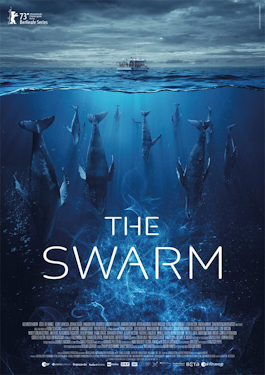“The Swarm”
is a 2023 all-European but mostly-German TV series based on a science fiction novel
by Frank Schätzing. I missed the first episode, so presumably I missed all the
action, since the later seven episodes are extremely dragging. Constant lab analyses are punctuated by boring relation problems and
bland attempts to be “woke”. And after enduring all this lobotomy, it turns out
that the last episode contains a cliffhanger to a yet non-existent second
season?! Indeed, the only interesting scene in the entire series is that five-second
cliffhanger…
And that´s
a real pity, since the story could have been interesting. Yes, it´s the Cthulhu
meme all over again, and it couldn´t have come at a more timely occasion either!
This summer, reports of killer whales attacking ships have featured prominently
in the media, and so has the climate crisis and deep sea drilling. “The Swarm” is
built around a similar premise: humanity is suddenly targeted by whales, crabs
and worms, the latter destroying the continental shelf and triggering huge
tsunamis. An international team of scientists, backed by mysterious Japanese
businessmen who may or may not have their own agendas, realize that the attacks
are coordinated. They turn out to be the work of a primordial super-organism
with a hive mind, somewhat whimsically referred to as the Yrr.
The Yrr
colony has lived under the ice in the Arctic since the time of Pangea, and was
hardly even aware of humanity´s existence before the climate crisis made the
ice melt (it´s never explained how they survived previous climate fluctuations
in Earth history). They aren´t very fond of oil rigs and deep sea mining either. In retaliation, the colony – which seems to consist of
impossibly large unicellular organisms working in tandem – bioengineers various
animals to attack the Homo sapiens intruders. The scientists try to communicate
with the hive from a science vessel in the Arctic, but kind-of-accidentally kill
one of the jumbo-sized cells. To show the Yrr that the human peace proposal is
serious, the science team decide to sacrifice one of their own to the colony. It´s
strongly implied in the closing scene of episode 8 that the sacrificed
scientist not only survives, but actually merges with the Yrr!
Parallels to the Cthulhu mythos are obvious (“Earth isn´t really ours”). Another source of inspiration is surely “The Kraken Wakes” by John Wyndham. Despite the bad execution, it is intriguing to see a science fiction production in which the threat comes very specifically from the sea, not from outer space. Suddenly, the sea has become a frontier again – after climate change is heating it up, orcas take on ships, Ukraine can´t export its grain, the transit crisis during the COVID pandemic, etc. I also think it´s obvious that the Yrr is/are a metaphor for Earth itself, seen as a living being (compare Gaia). And why the constant claim that humans and Yrr are somehow related, both hailing from the ocean?
I might consider watching a second season (if it´s ever made) for Zeitgeist-related reasons. It might be interesting to see if the script-writers will take the story in a more New Age Gaia-type direction, or rather start working even harder on the Cthulhu angle. Maybe that´s ultimately up to us. We Are The Zeitgeist.

No comments:
Post a Comment